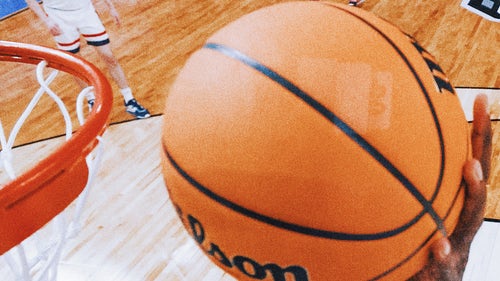
Hall of Fame coach and administrator C.M. Newton, 88, dies
C.M. Newton's life in basketball started as a player, but he impacted the game even more as a coach and administrator thanks to a belief in diversity and a grand vision that changed the rules and influenced the selection of the original U.S. Olympic ''Dream Team'' in 1992.
Officials at Alabama and Kentucky announced Monday night that the Hall of Famer has died. He was 88.
Newton was a member of Kentucky's 1951 NCAA championship squad during a basketball career spanning more than 50 years as a player, coach and administrator.
Newton was 509-375 as a coach at Transylvania College, Alabama and Vanderbilt and worked on several NCAA Division I basketball committees.
Inducted into the Naismith Hall of Fame in 2000, Newton was also a member of several halls of fame.
As Kentucky's athletic director, Newton's hiring of eventual Hall of Famer Rick Pitino as men's basketball coach helped the Wildcats overcome NCAA sanctions to win the 1996 national title.
He integrated Alabama's basketball program and later hired Kentucky's first African-American women's and men's basketball coaches in Bernadette Mattox and Tubby Smith, respectively.
''Integrating the program was the thing,'' Newton said in a 1999 media guide biography. ''It had importance not only at Alabama, but also around the league. We took in-state talent and won nationally. That opened the door for a lot of African-American youngsters.''
Current Kentucky athletic director Mitch Barnhart said Newton was ''a giant'' at the school, with the SEC and throughout the sport.
''His coaching accomplishments and honors at Transylvania, Alabama and Vanderbilt speak for themselves,'' Barnhart said in a release. ''His contributions to the sport of basketball continue to this day.''
Southeastern Conference Commissioner Greg Sankey tweeted, ''His legacy lives on through the many lives he touched.''
Born in Rockwood, Tennessee, Charles Martin Newton was a baseball pitcher at UK in addition to playing basketball from 1948-51, where he lettered on the `51 Wildcats team that won their third NCAA title under legendary coach Adolph Rupp.
Newton began his coaching career in Lexington at nearby Transylvania College before moving on to the SEC at Alabama and Vanderbilt. The Crimson Tide won three consecutive SEC titles from 1974-76 under Newton and reached the postseason six times. He also was named The Associated Press' SEC Coach of the Year in 1972 and 1976 while at Alabama and again in 1988 and 1989 while coaching Vanderbilt.
''Coach Newton was a true leader in intercollegiate athletics,'' Alabama athletic director Greg Byrne said. ''He took risks and was willing to do the right thing even when it was not the most popular thing.
''Thousands of student-athletes have been positively impacted because of his approach as an athletics director, a coach and an exemplary human being.''
Newton also served as an assistant SEC commissioner. Kentucky coach John Calipari said that Newton's hiring of Smith motivated him to learn more about SEC history, particularly with integration.
''I asked him how he was able to have the courage to go against the grain in Alabama at that time,'' Calipari wrote in a blog last week. ''He told me, `I saw people as people. And I wanted to win. I was trying to bring in the best players. I didn't care if they were black, white, green or gold. I wanted to win.'''
Vanderbilt hired Newton in 1981, and he went 129-115 with the Commodores, notching his 500th career victory in 1989. He also coached Vanderbilt to the Sweet 16 in the 1988 NCAA Tournament with Barry Goheen knocking down not one, but two 3-pointers late in a dramatic overtime victory over Pittsburgh.
Former Vanderbilt and NBA player Will Perdue said Newton was more than a coach.
''He was my father away from home, a role model for me to look up to, a motivator and a truly patient individual,'' Perdue said. ''He taught me basketball, but he also taught me what's expected of a man. The basketball community has lost its best friend.''
Newton returned to Kentucky as athletic director in 1989 to shepherd the men's program's recovery from NCAA sanctions that included a two-year postseason ban. His hiring of Pitino as coach was the key step in Kentucky's difficult climb from the penalties.
''From a competitive standpoint, the key in my coming to Kentucky was to have men's basketball succeed in a short period of time,'' Newton said.
Kentucky's journey included heartbreak, with a stunning 104-103 overtime loss to eventual champion Duke in the 1992 NCAA Tournament East Region final. A last-second jumper by the Blue Devils' Christian Laettner won that game which has come to be called college basketball's greatest contest. A year later Kentucky was in the Final Four before climbing back on top of college basketball as the 1996 champion. But Newton's astute personnel decisions didn't stop with Pitino.
In 1995 he made Mattox, a Pitino assistant, the Wildcats' first African-American women's coach. The program went 21-11 in 1988-89 and reached the second round of the NCAA Tournament, its first 20-win effort and postseason berth in nearly a decade. After Pitino left Kentucky for the NBA in 1997, Newton hired Smith as his replacement.
The Wildcats earned the 1998 national title in Smith's first season, and Newton handed the coach the championship trophy while serving as chairman of the NCAA Tournament committee.
''He has always encouraged me and other coaches to be involved with the NABC and help influence the game of basketball,'' Smith tweeted. ''He was a pioneer in a lot of areas, including having the courage to hire an African-American as coach at Kentucky and to recruit African-Americans at Alabama.''
Newton retired as AD in 1999. Newton also made his mark during the 1990s on the national level as director of USA Basketball from 1992-96, overseeing the U.S. Olympic Team's roster transformation from college players to a collection of NBA superstars.
Michael Jordan, Magic Johnson and Larry Bird were the most famous of a powerhouse lineup of future Hall of Famers comprising that initial 1992 ''Dream Team'' that dominated the Summer Games in Barcelona and won the gold medal.
Newton was enshrined in the Naismith Memorial Basketball Hall of Fame in 2000, three years after receiving the John Bunn Lifetime Achievement Award. Newton had two daughters and a son with his first wife Evelyn, who died in 1999. He is survived by wife Nancy, whom he married in 2002.
---
AP Sports Writers John Zenor in Tuscaloosa, Alabama, and Teresa M. Walker in Nashville, Tennessee, contributed to this report.










